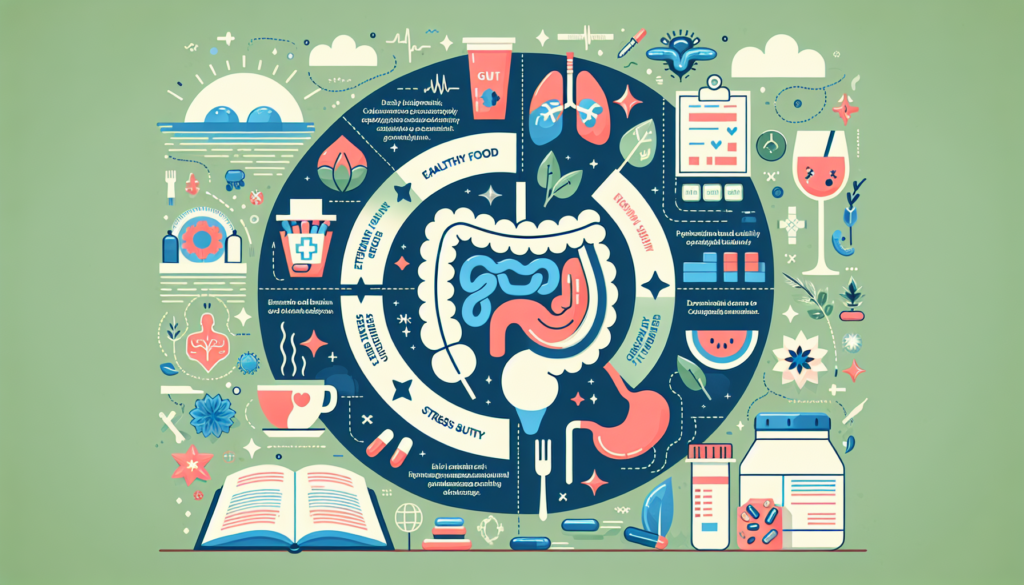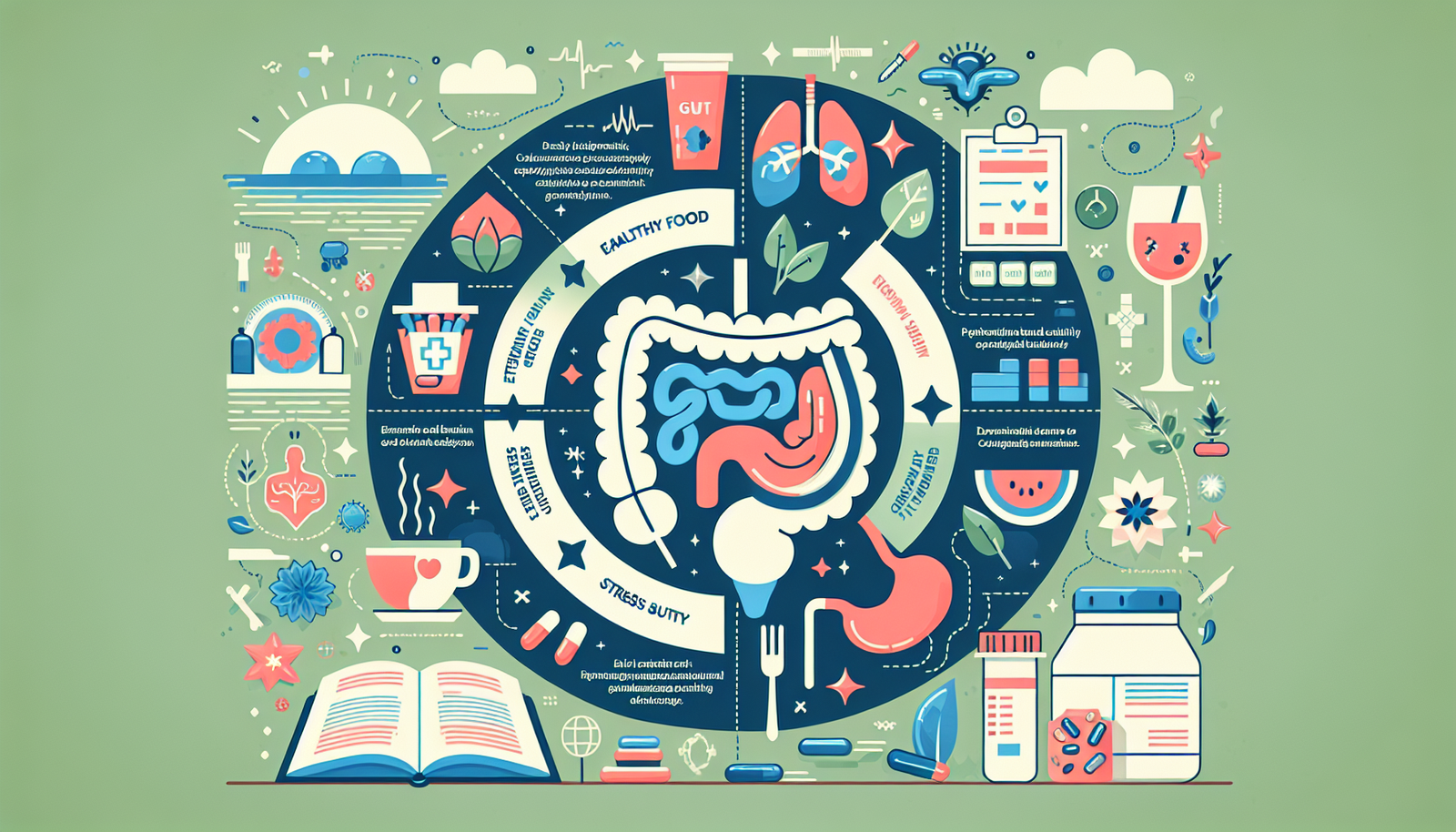In today’s fast-paced world, it’s easy to overlook the importance of gut health when striving for overall wellbeing. However, taking care of your gut can have a profound impact on your physical and mental health. From boosting your immune system to improving digestion, prioritizing gut health is key to leading a healthier and happier life. This article explores the significance of gut health and provides valuable tips on how to prioritize it in your daily routine. So, let’s discover the secrets to a thriving gut and unlock the door to optimum wellbeing.

How Does Gut Health Affect Overall Wellbeing?
Understanding the Gut-Brain Connection
The gut-brain connection refers to the bidirectional communication between the gut and the brain. This connection is facilitated by a complex network of nerves, hormones, and chemical messengers. The health of your gut directly impacts your mood, emotions, and cognitive function. When your gut is out of balance, it can lead to feelings of anxiety, depression, and even contribute to neurodegenerative disorders like Alzheimer’s and Parkinson’s disease.
The Role of Gut Microbiota
Gut microbiota, also known as gut flora, refers to the trillions of bacteria that reside in your gut. These bacteria play a crucial role in maintaining proper gut health. They help with digestion, produce vitamins, regulate metabolism, and support a healthy immune system. When there is an imbalance in the gut microbiota, it can lead to health issues such as inflammation, autoimmune diseases, and even obesity.
Impact on Mental Health
Research has shown a strong link between the gut and mental health. The gut microbiota produces neurotransmitters like serotonin, which is often referred to as the “happy hormone.” Serotonin plays a key role in regulating mood, and an imbalance in gut bacteria can lead to a decrease in serotonin production, resulting in mood disorders such as anxiety and depression. Taking care of your gut health through a balanced diet and probiotic supplementation can help improve your mental well-being.
Influence on Immune Function
Approximately 70% of our immune system resides in the gut. A healthy gut acts as a barrier against harmful pathogens, toxins, and other foreign substances. It helps stimulate an appropriate immune response and prevents the body from overreacting to harmless substances, leading to conditions like allergies and autoimmune diseases. By maintaining a healthy gut, you can strengthen your immune system and reduce the risk of illnesses.
Effect on Nutrient Absorption
The gut plays a vital role in absorbing nutrients from the food you eat. If your gut is not functioning optimally, it can lead to nutrient deficiencies, even if you have a healthy diet. This can result in various health issues such as fatigue, weakened immune system, and poor overall wellbeing. By prioritizing gut health, you can ensure that your body efficiently absorbs and utilizes the nutrients it needs to thrive.
Factors that Disrupt Gut Health
Unhealthy Diet
A diet high in processed foods, artificial additives, sugar, and unhealthy fats can disrupt the balance of gut bacteria. These foods promote the growth of harmful bacteria while suppressing beneficial ones. This imbalance can lead to inflammation, digestive issues, and a weakened immune system. To prioritize gut health, focus on a diet rich in whole foods, fiber, and fermented foods.
Stress and Anxiety
Chronic stress and anxiety have a significant impact on the gut. During times of stress, the body produces stress hormones that can interfere with digestion and disrupt the balance of gut bacteria. This can lead to digestive symptoms such as bloating, diarrhea, and constipation. Managing stress through techniques like meditation, exercise, and self-care can help support a healthy gut.
Lack of Sleep
Sleep deprivation can disrupt the gut microbiota and impair gut function. It can lead to an increase in harmful bacteria and a decrease in beneficial ones. Lack of sleep has also been linked to increased inflammation and a higher risk of developing chronic diseases such as obesity and diabetes. Prioritizing good sleep hygiene and getting sufficient rest is essential for maintaining a healthy gut.
Environmental Toxins
Exposure to environmental toxins such as pesticides, heavy metals, and pollutants can disrupt the gut microbiota and lead to gut inflammation. These toxins can enter the body through contaminated food, water, and air. To minimize exposure, choose organic produce, filter your water, and avoid contact with harmful chemicals.
Overuse of Antibiotics
While antibiotics are necessary to treat bacterial infections, their overuse can have detrimental effects on gut health. Antibiotics not only kill harmful bacteria but also disrupt the balance of beneficial bacteria in the gut. This can lead to digestive issues, antibiotic resistance, and an increased risk of developing certain diseases. If you need to take antibiotics, it’s important to replenish your gut with probiotics afterward.
Signs of Poor Gut Health
Digestive Discomfort
One of the most common signs of poor gut health is digestive discomfort. This can manifest as bloating, gas, stomach pain, indigestion, and irregular bowel movements. If you frequently experience these symptoms, it may indicate an imbalance in your gut microbiota that needs to be addressed.
Bloating and Gas
Excessive bloating and gas can be uncomfortable and embarrassing. They are often caused by an overgrowth of bacteria in the gut, leading to fermentation of undigested food. This can result in the production of excess gas, leading to bloating and flatulence.
Food Sensitivities
Food sensitivities occur when your immune system reacts to certain foods, causing symptoms such as bloating, diarrhea, nausea, and skin rashes. An imbalanced gut microbiota can contribute to the development of food sensitivities, as it can lead to increased intestinal permeability, allowing undigested food particles to enter the bloodstream and trigger an immune response.
Skin Issues
The health of your gut can also reflect on your skin. Conditions like acne, eczema, rosacea, and psoriasis have been linked to gut imbalances and inflammation. When the gut is not functioning optimally, toxins and inflammatory molecules can be released into the bloodstream, leading to skin issues.
Frequent Illnesses
A compromised immune system due to poor gut health can make you more susceptible to infections and illnesses. If you find yourself frequently falling sick or taking longer to recover from illnesses, it may be a sign that your gut needs attention.
Ways to Prioritize Gut Health
Eating a Balanced Diet
A balanced diet rich in whole foods, fiber, and nutrients is essential for maintaining a healthy gut. Focus on incorporating a variety of fruits, vegetables, whole grains, lean proteins, and healthy fats into your meals. These foods provide the necessary nutrients and promote the growth of beneficial bacteria in the gut.
Consuming Probiotic-Rich Foods
Probiotics are beneficial bacteria that can help restore the balance of gut microbiota. Incorporating probiotic-rich foods into your diet can support a healthy gut. Examples include yogurt, kefir, sauerkraut, kimchi, and kombucha. These foods provide live cultures that can populate your gut with beneficial bacteria.
Reducing Stress Levels
Managing stress is crucial for maintaining a healthy gut. Engage in activities that help you relax and unwind, such as meditation, deep breathing exercises, yoga, and spending time in nature. Prioritize self-care and find healthy coping mechanisms to reduce stress levels.
Getting Sufficient Sleep
Adequate sleep is essential for gut health. Aim for 7-8 hours of quality sleep each night. Establish a routine, create a restful sleep environment, and practice good sleep hygiene to ensure a good night’s sleep.
Avoiding Exposure to Toxins
Reducing your exposure to environmental toxins can help protect your gut health. Choose organic and locally sourced produce whenever possible. Filter your water to remove contaminants. Use natural cleaning products and avoid unnecessary exposure to harmful chemicals.
Using Antibiotics Responsibly
If you need to take antibiotics, it’s important to use them responsibly. Follow your healthcare provider’s instructions and complete the full course of antibiotics. Afterward, consider taking probiotic supplements to replenish your gut with beneficial bacteria. Consult with your healthcare provider for personalized advice.

The Role of Prebiotics and Fiber
What are Prebiotics?
Prebiotics are non-digestible fibers that serve as food for beneficial bacteria in the gut. They help stimulate the growth and activity of these beneficial bacteria, promoting a healthy gut microbiota. Prebiotics are typically found in foods like onions, garlic, leeks, bananas, asparagus, and chicory root.
Benefits of Prebiotics
Including prebiotic-rich foods in your diet can have several benefits for gut health. Prebiotics help support the growth of beneficial bacteria, enhance digestion, improve nutrient absorption, and strengthen the gut barrier. They can also help regulate bowel movements and reduce the risk of developing certain diseases.
Sources of Prebiotics
Incorporating prebiotic-rich foods into your diet is a great way to support a healthy gut. Some excellent sources of prebiotics include onions, garlic, leeks, bananas, whole grains, legumes, asparagus, and chicory root. By incorporating these foods into your meals, you can nourish your gut bacteria and promote a balanced gut microbiome.
The Importance of Dietary Fiber
Dietary fiber is crucial for maintaining a healthy gut. It helps bulk up the stool, improve digestion, and regulate bowel movements. Fiber also acts as a prebiotic, providing nourishment for beneficial gut bacteria. It can be found in fruits, vegetables, whole grains, legumes, and nuts. Ensuring an adequate intake of dietary fiber is essential for supporting gut health.
Finding the Right Probiotics
Understanding Probiotics
Probiotics are live bacteria and yeasts that are beneficial for gut health. They help restore the balance of gut microbiota and support digestive health. Probiotics can be found in both supplement form and certain fermented foods. They work by colonizing the gut and competing with harmful bacteria for resources and space.
Common Probiotic Strains
There are several different strains of probiotics, each with its unique benefits. Some common probiotic strains include Lactobacillus acidophilus, Bifidobacterium bifidum, Lactobacillus rhamnosus, and Saccharomyces boulardii. These strains have been extensively studied and shown to support gut health.
Choosing the Right Probiotics
When choosing a probiotic supplement, it’s important to consider the specific strains and the needs of your gut. Look for a supplement that contains multiple strains of beneficial bacteria and has a high colony-forming unit (CFU) count. CFU refers to the number of viable bacteria in the product. Different strains have different benefits, so consult with a healthcare professional or a registered dietitian to determine the right probiotic for you.
Probiotic Supplements vs. Fermented Foods
Both probiotic supplements and fermented foods can be beneficial for gut health. Probiotic supplements offer a more concentrated and controlled source of beneficial bacteria. They are convenient and can provide targeted strains based on your needs. On the other hand, fermented foods like yogurt, kefir, sauerkraut, and kimchi also contain live cultures and provide additional nutrients. Including a combination of probiotic supplements and fermented foods in your diet can be beneficial for gut health.
Supporting Gut Health with Lifestyle Choices
Regular Exercise
Regular exercise is not only important for physical fitness but also for gut health. Exercise helps stimulate bowel movements and promotes regularity. It also aids in reducing stress levels and inflammation, both of which are important for maintaining a healthy gut.
Stress Management Techniques
As previously mentioned, chronic stress can have a negative impact on gut health. Implementing stress management techniques such as meditation, deep breathing exercises, yoga, and journaling can help reduce stress levels and support a healthy gut.
Adequate Hydration
Drinking sufficient water is essential for gut health. Water helps soften the stool and prevent constipation. It also aids in digestion and the absorption of nutrients. Aim to drink at least 8 glasses of water per day and adjust your intake based on your activity level and climate.
Sleep Hygiene
Establishing a consistent sleep routine and practicing good sleep hygiene can greatly benefit gut health. Create a sleep-friendly environment, limit exposure to screens before bed, and avoid stimulating activities close to bedtime. Prioritizing good quality sleep is essential for supporting a healthy gut.
The Role of Gut Health in Weight Management
Effects on Metabolism
Gut health plays a significant role in metabolism. An imbalanced gut microbiota can contribute to weight gain and obesity. Certain bacteria in the gut extract more calories from food and promote the storage of fat. In contrast, a diverse and balanced gut microbiome is associated with a healthy metabolism and a reduced risk of weight gain.
Impact on Hunger and Appetite
The gut communicates with the brain to regulate hunger and appetite. Signals are sent through hormones and nerve pathways, influencing feelings of hunger and satiety. An imbalanced gut microbiota can affect these signaling pathways, leading to increased cravings, overeating, and a disrupted appetite regulation.
The Importance of a Balanced Microbiome
Maintaining a balanced gut microbiome is crucial for weight management. A diverse range of beneficial bacteria in the gut is associated with a healthy weight and metabolism. To support gut health and weight management, prioritize a diet rich in whole foods, fiber, and probiotics, while avoiding processed foods, sugar, and unhealthy fats.
Seeking Professional Help for Gut Health
When to Consult a Healthcare Provider
If you are experiencing persistent digestive issues, frequent illnesses, or other signs of poor gut health, it may be beneficial to consult a healthcare provider. They can help assess your symptoms, perform diagnostic tests, and provide personalized recommendations to improve your gut health. Additionally, if you are considering taking probiotic supplements, working with a healthcare provider can help you find the right strains and dosages for your specific needs.
Diagnostic Tests for Gut Health
There are several diagnostic tests that can assess the health of your gut and identify any imbalances or underlying conditions. These tests may include stool analysis, breath tests, blood tests, and allergy testing. The results of these tests can provide valuable insights into your gut health and guide appropriate treatment strategies.
Working with a Registered Dietitian
Registered dietitians are trained professionals who specialize in nutrition and can provide expert guidance on optimizing gut health. They can help develop personalized meal plans, recommend specific probiotics or prebiotics, and offer practical advice for implementing lifestyle changes. Working with a registered dietitian can be beneficial for individuals looking to improve their gut health for overall wellbeing.
Conclusion
Prioritizing gut health is essential for overall wellbeing. The health of your gut directly impacts mental health, immune function, nutrient absorption, and many other aspects of your body’s functioning. By understanding the gut-brain connection, maintaining a balanced diet, managing stress levels, and incorporating probiotics and prebiotics, you can support a healthy gut. Remember to consult with healthcare professionals for personalized advice and seek help if you are experiencing persistent gut health issues. Taking care of your gut health is a significant step towards improving your overall wellbeing.

